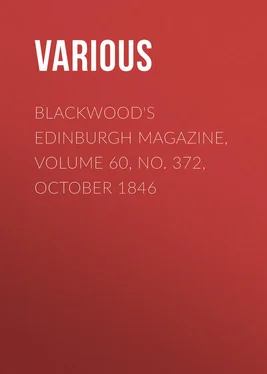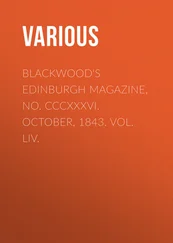Various - Blackwood's Edinburgh Magazine, Volume 60, No. 372, October 1846
Здесь есть возможность читать онлайн «Various - Blackwood's Edinburgh Magazine, Volume 60, No. 372, October 1846» — ознакомительный отрывок электронной книги совершенно бесплатно, а после прочтения отрывка купить полную версию. В некоторых случаях можно слушать аудио, скачать через торрент в формате fb2 и присутствует краткое содержание. Издательство: Иностранный паблик, Жанр: periodic, foreign_edu, Путешествия и география, на английском языке. Описание произведения, (предисловие) а так же отзывы посетителей доступны на портале библиотеки ЛибКат.
- Название:Blackwood's Edinburgh Magazine, Volume 60, No. 372, October 1846
- Автор:
- Издательство:Иностранный паблик
- Жанр:
- Год:неизвестен
- ISBN:нет данных
- Рейтинг книги:3 / 5. Голосов: 1
-
Избранное:Добавить в избранное
- Отзывы:
-
Ваша оценка:
- 60
- 1
- 2
- 3
- 4
- 5
Blackwood's Edinburgh Magazine, Volume 60, No. 372, October 1846: краткое содержание, описание и аннотация
Предлагаем к чтению аннотацию, описание, краткое содержание или предисловие (зависит от того, что написал сам автор книги «Blackwood's Edinburgh Magazine, Volume 60, No. 372, October 1846»). Если вы не нашли необходимую информацию о книге — напишите в комментариях, мы постараемся отыскать её.
Blackwood's Edinburgh Magazine, Volume 60, No. 372, October 1846 — читать онлайн ознакомительный отрывок
Ниже представлен текст книги, разбитый по страницам. Система сохранения места последней прочитанной страницы, позволяет с удобством читать онлайн бесплатно книгу «Blackwood's Edinburgh Magazine, Volume 60, No. 372, October 1846», без необходимости каждый раз заново искать на чём Вы остановились. Поставьте закладку, и сможете в любой момент перейти на страницу, на которой закончили чтение.
Интервал:
Закладка:
Scotland, however, is tolerably well known to the educated people of the sister country, and her productions have ceased to be a marvel. Grouse are common as howtowdies in the London market; and even red-deer venison, if asked for, may be had for a price. There is no great mystery in the staple commodity of our sports. Something, it is true, may still be said with effect regarding deer-stalking – a branch of the art venatory which few have the opportunity to study, and of those few a small fraction only can attain to a high degree. Grouse are to be found on every hill, black-game in almost every correi; few are the woods, at the present day, unhaunted by the roe; but the red-deer – the stag of ten – he of the branches and the tines – is, in most parts of the country save in the great forests, a casual and a wandering visitor; and many a summer's day you may clamber over cairn and crag, inspect every scaur and glen, and sweep the horizon around with your telescope, without discovering the waving of an antler, or the impress of a transitory footprint. But this subject is soon exhausted. Scrope has done ample justice to it, and left but a small field untrodden to any literary successor. The Penny Magazine , if we mistake not, disposed several years ago of otter-hunting, and the chase of the fox as practised in the rocky regions; and finally, Colquhoun – he of the Moor and the Loch – with more practical knowledge and acute observation than any of his predecessors, reduced Highland sporting to a science, and became the Encyclopedist of the feræ naturæ of the hills. With these authorities already before us, it was not unnatural that we should have entertained doubts as to the capabilities of any new writer, not native nor to the custom born.
Neither did the puff preliminary, which heralded the appearance of this volume, prepossess us strongly in its favour. What mattered it to the sensible reader whether or no "the attention of the public has already been called to this journal by the Quarterly Review of December 1845?" The book was not published, had not an existence, until seven or eight months after that article – a reasonably indifferent one, by the way – was penned; and yet we are asked to take that sort of pre-Adamite notice as a verdict in its favour! Now, we object altogether to this species of side-winded commendation, this reviewing, or noticing, or extracting from manuscripts before publication, more especially in the pages of a great and influential Review. It is always injudicious, because it looks like the work of a coterie. In the present case it was doubly unwise, because this volume really required no adventitious aid whatever, and certainly no artifice, to recommend it to the public favour.
Whilst, however, we consider it our duty to say thus much, let it not be supposed that we are detracting from the merits of the extracts contained in that article of the Quarterly . On the contrary, they impressed us at the time with a high idea of the graphic power of the writer, and presented an agreeable contrast to the general prolixity of the paper. It is even possible that we are inclined to underrate the efforts of the critic on account of his having forestalled us by printing The Muckle Hart of Benmore – a chapter which we should otherwise have certainly enshrined within the columns of Maga . – At all events it is now full time that we should address ourselves more seriously to the contents of the volume.
Mr St John, we are delighted to observe, is not a sportsman belonging to either class which we have above attempted to describe. He is not the man whose exploits will be selected to swell the lists of slaughtered game in the pages of the provincial newspapers; for he has the eye and the heart of a naturalist, and, as he tells us himself, after a pleasant description of the wild animals which he has succeeded in domesticating – "though naturally all men are carnivorous, and, therefore, animals of prey, and inclined by nature to hunt and destroy other creatures, and, although I share in this our natural instinct to a great extent, I have far more pleasure in seeing these different animals enjoying themselves about me, and in observing their different habits, than I have in hunting down and destroying them."
Most devoutly do we wish that there were many more sportsmen of the same stamp! For ourselves, we confess to an organ of destructiveness not of the minimum degree. We never pass a pool, and hear the sullen plunge of the salmon, without a bitter imprecation upon our evil destiny if we chance to have forgotten our rod; and a covey rising around us, when unarmed, is a plea for suicide. But this feeling, as Mr St John very properly expresses it, is mere natural instinct – part of our original Adam, which it is utterly impossible to subdue. But give us rod or gun. Let us rise and strike some three or four fresh-run fish, at intervals of half-an-hour – let us play, land, and deposit them on the bank, in all the glory of their glittering scales, and it is a hundred to one if we shall be tempted to try another cast, although the cruives are open, the water in rarest trim, and several hours must elapse ere the advent of the cock-a-leekie. In like manner, we prefer a moor where the game is sparse and wild, to one from which the birds are rising at every twenty yards; nor care we ever to slaughter more than may suffice for our own wants and those of our immediate friends. And why should we? There is something not only despicable, but, in our opinion, absolutely brutal, in the accounts which we sometimes read of wholesale massacres committed on the moors, in sheer wanton lust for blood. Fancy a great hulking Saxon, attended by some half-dozen gamekeepers, with a larger retinue of gillies, sallying forth at early morning upon ground where the grouse are lying as thick and tame as chickens in a poultry-yard – loosing four or five dogs at a time, each of which has found his bird or his covey before he has been freed two minutes from the couples – marching up in succession to each stationary quadruped – kicking up the unfortunate pouts, scarce half-grown, from the heather before his feet – banging right and left into the middle of them, and – for the butcher shoots well – bringing down one, and sometimes two, at each discharge. The red-whiskered keeper behind him, who narrowly escaped transportation, a few years ago, for a bloody and ferocious assault, hands him another gun, ready-loaded; and so on he goes, for hour after hour, depopulating God's creatures, of every species, without mercy, until his shoulder is blue with the recoil, and his brow black as Cain's, with the stain of the powder left, as he wipes away the sweat with his stiff and discoloured hand. At evening, the pyramid is counted, and lo, there are two hundred brace!
Is this sporting, or is it murder? Not the first certainly, unless the term can be appropriately applied to the hideous work of the shambles. Indeed, between knocking down stots or grouse in this wholesale manner, we can see very little distinction; except that, in the one case, there is more exertion of the muscles, and in the other a clearer atmosphere to nerve the operator to his task. Murder is a strong term, so we shall not venture to apply it; but cruelty is a word which we may use without compunction; and from that charge, at least, it is impossible for the glutton of the moors to go free.
Great humanity and utter absence of wantonness in the prosecution of his sport, is a most pleasing characteristic of Mr St John. He well understands the meaning of Wordsworth's noble maxim, —
"Never to blend our pleasure or our pride
With sorrow of the meanest thing that feels;"
and can act upon it without cant, without cruelty, and, above all, without hypocrisy. And truly, when we consider where he has been located for the last few years, in a district which offers a greater variety of game to the sportsman than any other in Great Britain, his moderation becomes matter of legitimate praise. Here is his own description of the locality wherein he has pitched his tent: —
Читать дальшеИнтервал:
Закладка:
Похожие книги на «Blackwood's Edinburgh Magazine, Volume 60, No. 372, October 1846»
Представляем Вашему вниманию похожие книги на «Blackwood's Edinburgh Magazine, Volume 60, No. 372, October 1846» списком для выбора. Мы отобрали схожую по названию и смыслу литературу в надежде предоставить читателям больше вариантов отыскать новые, интересные, ещё непрочитанные произведения.
Обсуждение, отзывы о книге «Blackwood's Edinburgh Magazine, Volume 60, No. 372, October 1846» и просто собственные мнения читателей. Оставьте ваши комментарии, напишите, что Вы думаете о произведении, его смысле или главных героях. Укажите что конкретно понравилось, а что нет, и почему Вы так считаете.












